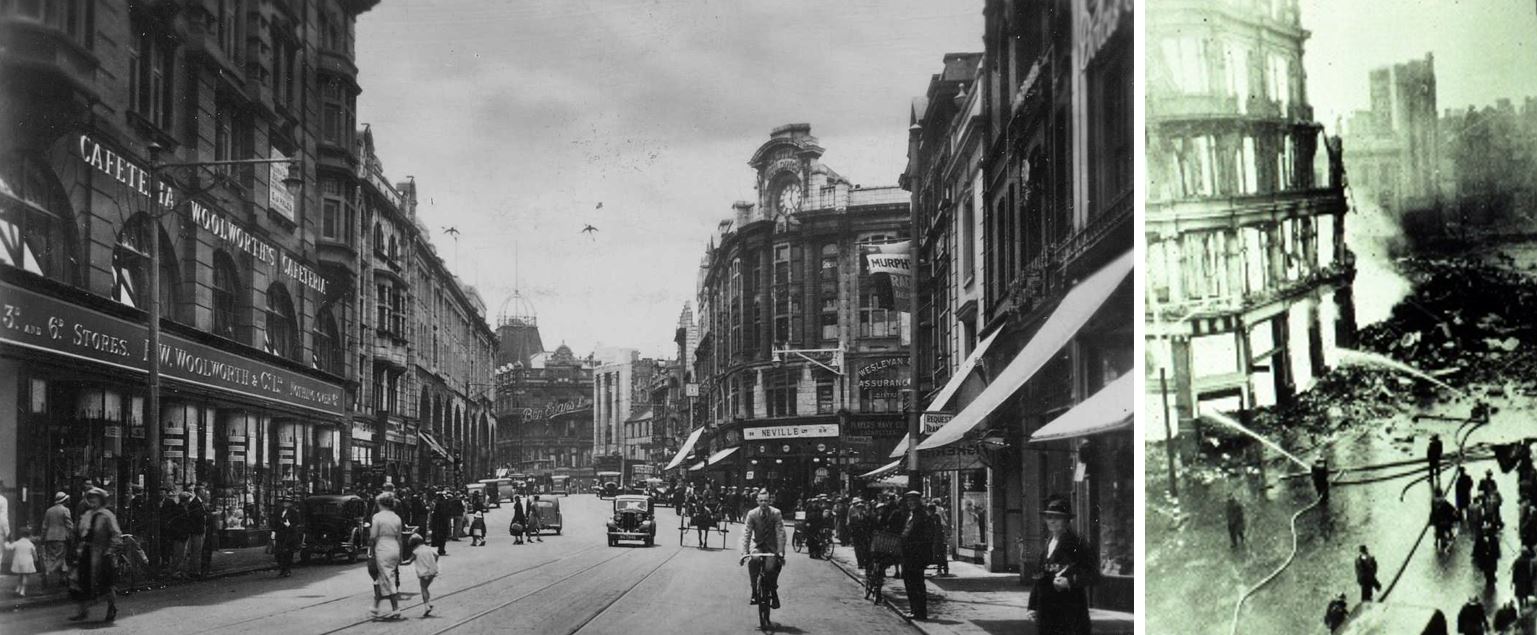‘Ashes now, under the snow’: Dylan Thomas’ ‘Return Journey’

‘I seem to remember a chap like you described. There couldn’t be two like him let’s hope.’
In Dylan Thomas’ radio broadcast, ‘Return Journey’, the narrator walks through Swansea seeking his younger selves, while attempting to piece together the Swansea he knew, now shattered by the Three Nights’ Blitz.
The Three Nights’ Blitz shook Swansea from 19-21 February 1941, killing 230 people and injuring 409. Hundreds of buildings were flattened, and many more damaged. Completed and broadcast in 1947, ‘Return Journey’ was conceived following Thomas’ experience of seeing the devastation at first hand. Walking through the remains of the town centre he knew so well, he saw his friend Bert Trick, and told him: ‘Our Swansea has died’.
The tone is set from the opening line: ‘It was a cold white day in High Street, and nothing to stop the wind slicing up from the Docks, for where the squat and tall shops had shielded the town from the sea lay their blitzed flat graves marbled with snow and headstoned with fences.’
As the narrator takes a familiar route from the train station into the town, personal history is bound in place; identity itself becomes unstable when such a traumatic event is inflicted on a location and its people. And it’s the voices of the people that are at the heart of this journey, trying to continue their daily lives amidst the ruins. When the narrator tries to find his old self in the pub, giving a lively description, the Barmaid replies ‘There’s words, what d’you want to find him for. I wouldn’t touch him with a barge pole, would you Mr Griffiths?’
The voices bring poignancy and humour; the narrator’s days as a young reporter are recalled through the words of the drinkers in the pubs he frequented, as they share a joke at his experience: ‘Ever seen Young Thomas covering a soccer match down the Vetch and working it out in tries?’
Still seeking his old self who had ‘mucked about chirpy as a sparrow after the sips and titbits and small change of the town’, he feels that ‘the voices of fourteen years ago hung silent in the snow and ruin’ as he makes his way towards the Kardomah. Here, he and his friends would talk of how ‘Dan Jones was going to compose the most prodigious symphony, Fred Janes paint the most miraculously meticulous picture, Charlie Fisher catch the poshest trout, Vernon Watkins and Young Thomas write the most boiling poems…’
But the Kardomah Café ‘was razed to the snow’ the voices ‘lost in the willy nilly flying of the years’, and the boys themselves scattered.
As the narrator leads us through Swansea ‘past the remembered invisible shops’ and towards his childhood haunts, the carefree days of school are recalled, undercut with the knowledge that some of those ‘none-too-clean urchin[s] lying his way unsuccessfully out of his homework’ would never return from war.
These boys are commemorated on the school’s roll of honour; Thomas wrote to one of his old masters at Swansea Grammar School to ensure that he had all their names. This matters too much for guesswork.
Beautifully written, moving, nostalgic and almost unbearably sad at times. ‘Return Journey’ ends away from the ruins of the town in the idyllic surroundings of Cwmdonkin Park, Dylan’s ‘world within the world of the sea-town’, his place of refuge, creativity, play and inspiration. But this too has changed. The Park-keeper remembers the boy who used to ‘climb the reservoir railings and pelt the old Swans. Run like a billygoat over the grass you should keep off of.’
He is asked what happened to this boy. ‘Dead’. The Park-keeper said. ‘Dead … Dead … Dead … Dead … Dead … Dead.’
This post is also available in: Welsh


